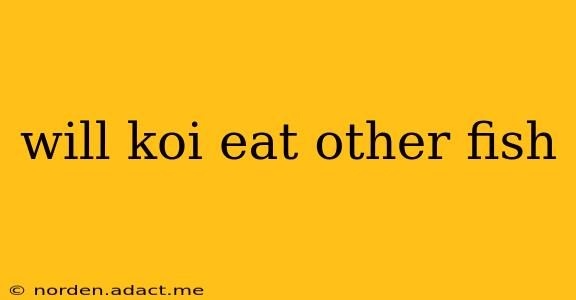Will Koi Eat Other Fish? A Comprehensive Guide to Koi Diet and Tank Mates
Koi, with their vibrant colors and graceful movements, are a popular choice for pond and aquarium enthusiasts. However, a common concern among prospective and current koi keepers is whether these seemingly serene creatures will consume other fish. The answer, unfortunately, isn't a simple yes or no. It depends on several factors, including the size of the koi, the size and species of other fish, and the availability of food.
What Do Koi Eat?
Understanding a koi's natural diet is crucial to predicting their behavior. In the wild, koi are omnivorous, meaning they consume both plants and animals. Their diet consists of:
- Algae: A significant portion of their natural food source.
- Insects: Including larvae, flies, and other invertebrates.
- Small crustaceans: Such as daphnia and water fleas.
- Plant matter: Various aquatic plants and their parts.
In captivity, a balanced koi diet typically includes high-quality commercial koi food pellets, supplemented with occasional treats like:
- Vegetables: Blanched peas, zucchini, and lettuce.
- Fruits: Small pieces of melon or berries (in moderation).
The key here is providing sufficient and appropriate nutrition. A well-fed koi is less likely to resort to predation.
Will Koi Eat Smaller Fish?
While koi are not inherently aggressive predators, they are opportunistic feeders. This means that if a smaller fish happens to be within reach, a koi, especially a larger one, might try to eat it. This is particularly true if the koi is underfed or if the smaller fish is already weak or injured. Young koi are less likely to eat other fish, but as they mature and grow larger, their appetite and ability to consume larger prey increase.
What Size Fish are Safe Tank Mates for Koi?
The best way to avoid predation is to choose tank mates that are significantly larger than your koi or too large for them to swallow. Fish that are swift and agile might also fare better, as they can evade a hungry koi. However, it's important to note that even large and quick fish can become prey if the koi are extremely hungry or if there's a sudden shift in their environment (e.g., overcrowding).
Are There Any Fish That Koi Will Definitely Not Eat?
There's no guarantee that a koi won't try to eat any other fish, but generally, very large and aggressive fish are less likely to be targeted. However, introducing such fish might create different kinds of aggression and territorial conflicts within the pond or tank.
How Can I Prevent My Koi From Eating Other Fish?
The best preventative measure is to provide your koi with a high-quality, balanced diet that satisfies their nutritional needs. Regular feeding ensures they are less likely to hunt for additional food sources. Sufficient hiding places for smaller fish can also help them evade koi. Careful selection of appropriately sized and hardy tank mates is crucial. Regular observation of your pond or aquarium can help you detect any potential problems early.
What Should I Do If My Koi Eats Another Fish?
If you witness your koi eating another fish, evaluate the situation. Assess your feeding practices and consider whether your koi are receiving enough food. If there's a persistent problem, you might need to re-evaluate your tank mates and ensure there are sufficient hiding places for the smaller fish. In some extreme cases, separation might be necessary.
In conclusion, while koi are not inherently aggressive predators, they are opportunistic feeders. Understanding their dietary needs, choosing appropriate tank mates, and providing a balanced and sufficient diet are key to preventing the consumption of other fish. Regular observation and proactive measures are crucial for maintaining a harmonious aquatic environment.
